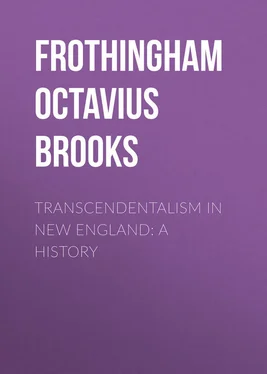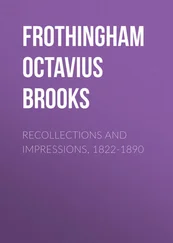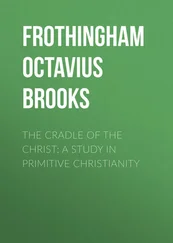Octavius Frothingham - Transcendentalism in New England - A History
Здесь есть возможность читать онлайн «Octavius Frothingham - Transcendentalism in New England - A History» — ознакомительный отрывок электронной книги совершенно бесплатно, а после прочтения отрывка купить полную версию. В некоторых случаях можно слушать аудио, скачать через торрент в формате fb2 и присутствует краткое содержание. Жанр: foreign_antique, foreign_prose, на английском языке. Описание произведения, (предисловие) а так же отзывы посетителей доступны на портале библиотеки ЛибКат.
- Название:Transcendentalism in New England: A History
- Автор:
- Жанр:
- Год:неизвестен
- ISBN:нет данных
- Рейтинг книги:4 / 5. Голосов: 1
-
Избранное:Добавить в избранное
- Отзывы:
-
Ваша оценка:
- 80
- 1
- 2
- 3
- 4
- 5
Transcendentalism in New England: A History: краткое содержание, описание и аннотация
Предлагаем к чтению аннотацию, описание, краткое содержание или предисловие (зависит от того, что написал сам автор книги «Transcendentalism in New England: A History»). Если вы не нашли необходимую информацию о книге — напишите в комментариях, мы постараемся отыскать её.
Transcendentalism in New England: A History — читать онлайн ознакомительный отрывок
Ниже представлен текст книги, разбитый по страницам. Система сохранения места последней прочитанной страницы, позволяет с удобством читать онлайн бесплатно книгу «Transcendentalism in New England: A History», без необходимости каждый раз заново искать на чём Вы остановились. Поставьте закладку, и сможете в любой момент перейти на страницу, на которой закончили чтение.
Интервал:
Закладка:
These somewhat too copious extracts have been purposely taken from the first volume of the "Specimens of Foreign Standard Literature," edited by George Ripley in 1838, rather than from the collected writings of Cousin, because they show what a leading New England transcendentalist thought most important in the teaching of the French school. His own estimate of the philosophy and his expectations from it may be learned from the closing passages of the introduction to that volume:
"The objects at which Mr. Coleridge aims, it seems to me, are in a great measure accomplished by the philosophy of Cousin. This philosophy demolishes, by one of the most beautiful specimens of scientific analysis that is anywhere to be met with, the system of sensation, against which Mr. Coleridge utters such eloquent and pathetic denunciations. It establishes on a rock the truth of the everlasting sentiments of the human heart. It exhibits to the speculative inquirer, in the rigorous forms of science, the reality of our instinctive faith in God, in virtue, in the human soul, in the beauty of holiness, and in the immortality of man.
"Such a philosophy, I cannot but believe, will ultimately find a cherished abode in the youthful affections of this nation, in whose history, from the beginning, the love of freedom, the love of philosophical inquiry, and the love of religion have been combined in a thrice holy bond. We need a philosophy like this to purify and enlighten our politics, to consecrate our industry, to cheer and elevate society. We need it for our own use in the hours of mental misgiving and gloom; when the mystery of the universe presses heavily upon our souls; when the fountains of the great deep are broken up, and the
"Intellectual power
Goes sounding on, a dim and perilous way,"
over the troubled waters of the stormy sea. We need it for the use of our practical men, who, surrounded on every side with the objects of sense, engrossed with the competitions of business, the rivalries of public life, or the cares of professional duty, and accustomed to look at the immediate and obvious utility of everything which appeals to their notice, often acquire a distaste for all moral and religious inquiries, and as an almost inevitable consequence, lose their interest, and often their belief, in the moral and religious faculties of their nature. We need it for the use of our young men, who are engaged in the active pursuits of life, or devoted to the cultivation of literature. How many on the very threshold of manly responsibility, by the influence of a few unhappy mistakes, which an acquaintance with their higher nature, as unfolded by a sound religious philosophy, would have prevented, have consigned themselves to disgrace, remorse, and all the evils of a violated conscience! How many have become the dupes of the sophists' eloquence, or the victims of the fanatics' terrors, for whom the spirit of a true philosophy – a philosophy 'baptized in the pure fountain of eternal love,' would have preserved the charm and beauty of life."
Cousin's "History of Philosophy," translated by H. G. Linberg, was published in 1832. The "Elements of Psychology," by C. S. Henry, appeared in 1834. Thus Cousin was early introduced and recommended, and his expositions of the German schools were received. The volume from which passages have been cited had an important influence on New England thought.
V.
TRANSCENDENTALISM IN ENGLAND
The prophet of the new philosophy in England was Samuel Taylor Coleridge; in the early part of the present century, perhaps the most conspicuous figure in our literary world; the object of more admiration, the centre of more sympathy, the source of more intellectual life than any individual of his time; the criticism, the censure, the manifold animadversion he was made the mark for, better attest his power than the ovations he received from his worshippers. The believers in his genius lacked words to express their sense of his greatness. He was the "eternal youth," the "divine child." The brilliant men of his period acknowledged his surpassing brilliancy; the deep men confessed his depth; the spiritual men went to him for inspiration. His mind, affluent and profuse, contained within no barriers of conventional form, poured an abounding flood of thoughts over the whole literary domain. He was essayist, journalist, politician, poet, dramatist, metaphysician, philosopher, theologian, divine, critic, expositor, dreamer, soliloquizer; in all eloquent, in all intense. The effect he produced on the minds of his contemporaries will scarcely be believed now. At present he is little more than a name: his books are pronounced unreadable; his opinions are not quoted as authority; his force is spent. But in 1851, Thomas Carlyle, then past the years of his enthusiasm, and verging on the scornful epoch of his intellectual career, spoke of him, in the "Life of Sterling," as "A sublime man, who, alone in those dark days, had saved his crown of spiritual manhood; escaping from the black materialisms and revolutionary deluges, with God, freedom, immortality still his; a king of men. The practical intellects of the world did not much heed him, or carelessly reckoned him a metaphysical dreamer; but to the rising spirits of the young generation he had this dusky, sublime character, and sat there as a kind of Magus , girt in mystery and enigma, his Dodona oak grove (Mr. Gillman's house at Highgate) whispering strange things, uncertain whether oracles or jargon." "To the man himself, Nature had given in high measure the seeds of a noble endowment, and to unfold it was forbidden him. A subtle, lynx-eyed intellect, tremulous, pious sensibility to all good and all beautiful; truly a ray of empyrean light, – but imbedded in such weak laxity of character, in such indolences and esuriences, as made strange work with it. Once more, the tragic story of a high endowment with an insufficient will."
The abatement is painfully just; but while Coleridge lived, this very indolence and moral imbecility added to the interest he excited, and gave a mystic splendor as of a divine inspiration to his mental performances. The distinction between unhealthiness and inspiration has never been clearly marked, and the voluble utterances of the feebly outlined and loosely jointed soul easily passed for oracles. Thus his moral deficiencies aided his influence. His wonderful powers of conversation or rather of effusion in the midst of admiring friends helped the illusion and the fascination. He really seemed inspired while he talked; and as his talk ranged through every domain, the listeners carried away and communicated the impression of a superhuman wisdom.
The impression that Coleridge made on minds of a very different order from Carlyle's, is given in the following lines by Aubrey de Vere:
"No loftier, purer soul than his hath ever
With awe revolved the planetary page
From infancy to age,
Of knowledge, sedulous and proud to give her
The whole of his great heart, for her own sake;
For what she is: not what she does, or what can make.
And mighty voices from afar came to him;
Converse of trumpets held by cloudy forms
And speech of choral storms.
Spirits of night and noontide bent to woo him;
He stood the while lonely and desolate
As Adam when he ruled a world, yet found no mate.
His loftiest thoughts were but as palms uplifted;
Aspiring, yet in supplicating guise —
His sweetest songs were sighs.
Adown Lethean streams his spirit drifted,
Under Elysian shades from poppied bank,
With amaranths massed in dark luxuriance dank.
Coleridge, farewell! That great and grave transition
Which may not king or priest or conqueror spare.
And yet a babe can bear,
Has come to thee. Through life a goodly vision
Was thine; and time it was thy rest to take.
Soft be the sound ordained thy sleep to break;
When thou art waking, wake me, for thy Master's sake."
Интервал:
Закладка:
Похожие книги на «Transcendentalism in New England: A History»
Представляем Вашему вниманию похожие книги на «Transcendentalism in New England: A History» списком для выбора. Мы отобрали схожую по названию и смыслу литературу в надежде предоставить читателям больше вариантов отыскать новые, интересные, ещё непрочитанные произведения.
Обсуждение, отзывы о книге «Transcendentalism in New England: A History» и просто собственные мнения читателей. Оставьте ваши комментарии, напишите, что Вы думаете о произведении, его смысле или главных героях. Укажите что конкретно понравилось, а что нет, и почему Вы так считаете.












